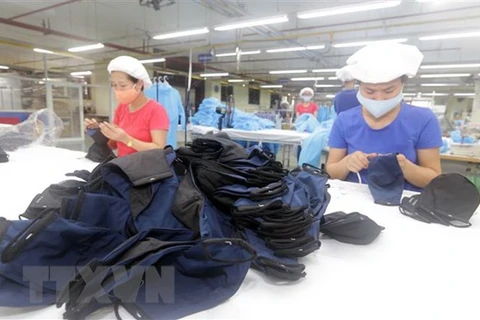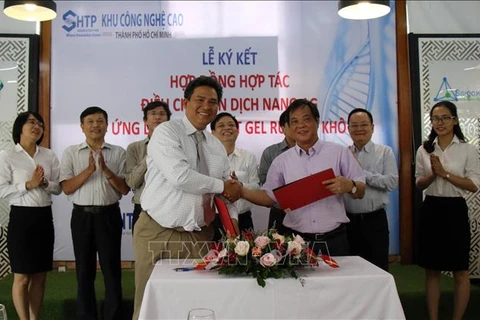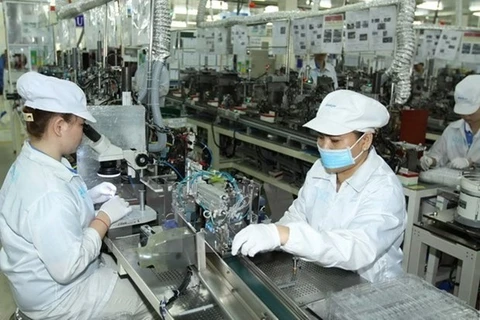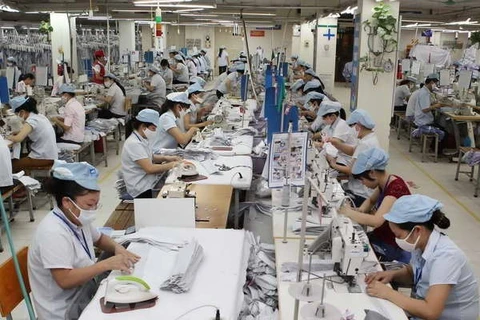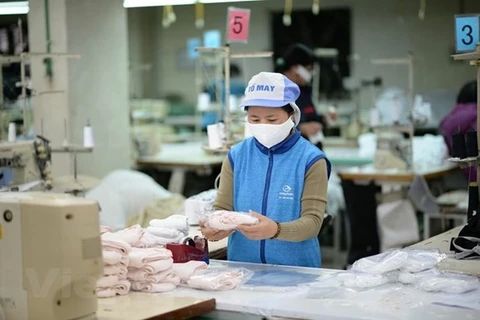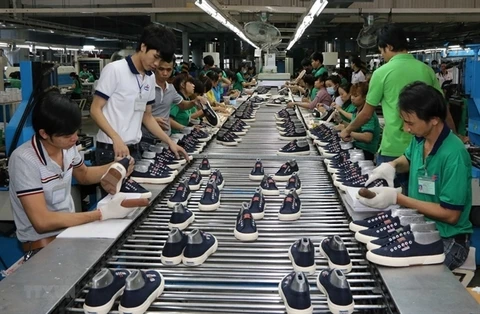 Mobile phone charging cables imported from China labeled as “Made-in-Vietnam” products seized by Hai Phong Customs in July 2019. (Photo: VietnamPlus)
Mobile phone charging cables imported from China labeled as “Made-in-Vietnam” products seized by Hai Phong Customs in July 2019. (Photo: VietnamPlus)
Hanoi (VNA) - Joining free trade agreements (FTAs), Vietnam has many opportunities to attract foreign direct investment (FDI) flows, but it also needs to take solutions to prevent frauds and abuse of State policies to illegally enjoy export incentives.
In the recent time, in order to take advantage of tax incentives that Vietnam enjoys from FTAs signed with foreign partners, a number of businesses and individuals have illegally used the “made-in-Vietnam” labels to enjoy preferential treatment for their exports.
Measures taken to prevent trade frauds, policy abuse
Tran Manh Cuong, Deputy Director of the Post-clearance Inspection Department under the General Department of Customs, said that Vietnam signed many important FTAs such as the Vietnam-US Bilateral Trade Agreement (BTA), the European Union – Vietnam FTA (EVFTA), creating a huge competitive advantage in attracting FDI, but also posing many challenges for managers.
The task is how to both to create a favorable environment for attracting s foreign investment and promptly prevent acts that take advantage of open policies of the State for profits.
Since the US-China trade war happened, the US administration officially imposed additional tariffs (trade defence, anti-dumping and anti-subsidy on many Chinese imports), leading to the differences in taxes for Vietnamese goods and Chinese goods exported to the US.
As a result, a number of Chinese products are subject to additional tariffs, especially those in the group of same goods that Vietnam has exported to the US, including electronics, garments, footwear, bicycles, furniture, steel products and solar panels.
To prevent the origin frauds, Cuong said that Prime Minister Nguyen Xuan Phuc issued Decision No. 824/QD-TTg dated July 4, 2019 approving a project on strengthening State management on trade defence evasion and origin frauds, and Resolution No.119/NQ-CP dated December 31, 2019 on a number of urgent measures to strengthen State management to prevent origin frauds and illegal transshipment of goods.
 TOPPER-branded shoes in a temporarily imported-shipment from China for re-export to a third country labeled as “made-in-Vietnam” seized by Hai Phong Customs in May 2019. (Photo: VietnamPlus)
TOPPER-branded shoes in a temporarily imported-shipment from China for re-export to a third country labeled as “made-in-Vietnam” seized by Hai Phong Customs in May 2019. (Photo: VietnamPlus)
Violations brought to light
Implementing directions of the Government, the Ministry of Finance and the customs sector have worked closely to combat origin frauds and illegal transshipments, Cuong said, adding that through inspections and verification, the customs sector has discovered common fraudulent methods.
Enterprises imported semi-finished products and only carried out simple assembly, or imported complete products and change packages and labels, he noted.
According Cuong, since the beginning of the year, the customs sector has inspected and verified 76 cases, discovered 24 violation cases of the origin of exports.
The sector has cooperated with the Ministry of Public Security to investigate a case with signs of counterfeiting certificates of origin and confiscated 3,590 bicycles, more than 4,000 bicycle parts and over 12,000 sets of spare parts for assembling kitchen cabinets as exhibits of violation, Cuong said.
The sector has collected over 33 billion VND, including the amount of illegal profits obtained from conducting violations, and fines for administrative violations and the value of confiscated exhibits.
 A container containing many finished mobile phone components and accessories imported from China but labeled as “Made-in-Vietnam: products seized by Hai Phong Customs in July 2019. (Photo: VietnamPlus).
A container containing many finished mobile phone components and accessories imported from China but labeled as “Made-in-Vietnam: products seized by Hai Phong Customs in July 2019. (Photo: VietnamPlus). Drastic solutions applied
Cuong said post-customs clearance inspection, investigation and verification of origin frauds and illegal transshipments are key activities of the customs sector in 2020 and the following years.
Recently, the General Department of Customs has taken synchronous and drastic solutions, initially preventing the abuse of tariff preferences brought by FTAs that Vietnam signed with foreign partners, especially the US, to commit violations of Vietnamese origin, which affect Vietnam's commitments to other countries.
Cuong said the customs sector has basically controlled the origin fraud of Vietnamese goods exported to the US, including bicycles, solar cells, seafood, wood, wooden products, and other items, avoiding adversely affecting Vietnamese exporters of traditional goods.
Representatives from the customs sector said that the Ministry of Finance should supplement regulations on how to calculate illegal profits for outsourcing units outside Vietnamese territory but their violation occurs in Vietnam.
The Ministry of Industry and Trade should take specific coordination regulations with the Ministry of Finance and customs agencies in checking and verifying the origin of imported and exported goods in line with specific guidance on labeling of goods, declaration of origin of exported goods as well as specific guidance documents on self-certification of origin, to ensure the feasible in sanctions and fraud prevention, he added./.
